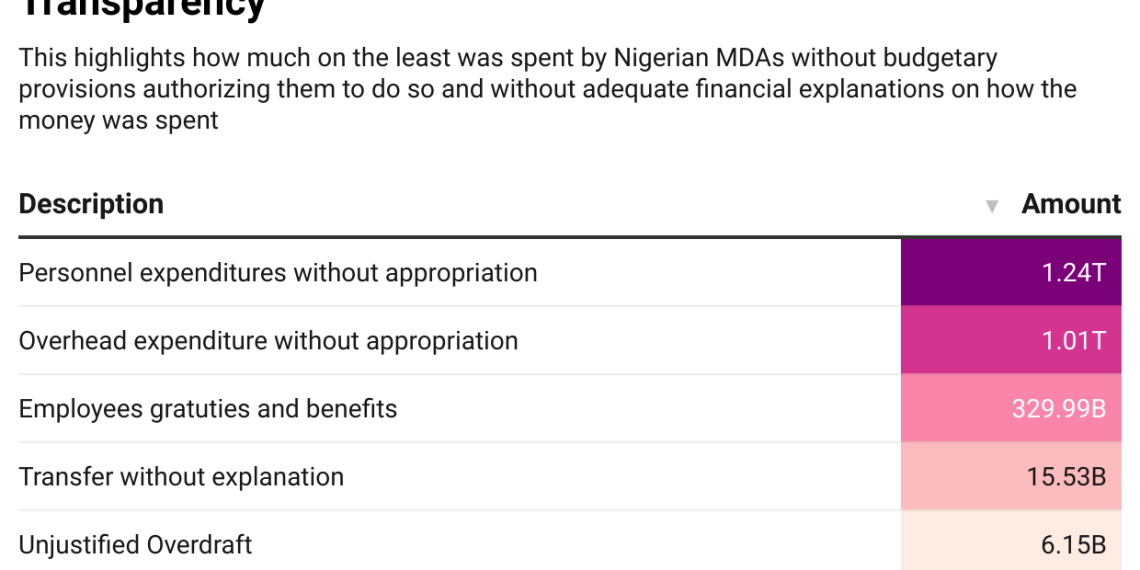Dataphyte’s review of Nigeria’s 2019 audit report has shown that Nigerian Ministries, Departments and Agencies spent monies running into trillions of naira without appropriation or financial transparency.
According to the 2019 audit report, the Nigerian ministry, department and agencies collectively are unable to account for at least N2.5 trillion.
The International Public Sector Accounting Standards (IPSAS) states that “Public sector entities are typically subject to budgetary limits in the form of appropriations or budget authorizations which may be given effect through authorization”.
However, MDAs continue to flagrantly disobey this provision. Not only do they spend above their budgets, invalidating the very essence of budgeting but also, all these excess spendings are done with little transparency and very often without appropriation.
84 Ministries, departments and agencies spent over N1.006 trillion in excess of their budgeted overhead expenditure. Overhead expenditures are operating expenses of any organization or establishment. The total budgeted overhead expenditure for the 84 MDAs was N38.208 billion, they however spent N1.044 trillion, accumulating an excess of N1.006 Trillion which could not be accounted for or explained as seen in the audit statement.
42 other MDAs spent N1.7 trillion on personnel costs as against N473 billion budgetary provision without said authorizations according to the audit report.
Another N6.1 billion was ‘withdrawn’ by fifty-five MDAs without appropriation.
The affected Ministries departments and agencies within this category, blamed the withdrawal on charges against MDAs operations by service providers for the usage of the gateway to the Central Bank of Nigeria.
Thirty-six MDAs transferred the sum of fifteen billion naira to individual accounts without description of the beneficiaries of the money. This is a clear violation of the provisions of the International Public Sector Accounting Standards (IPSAS).
IPSAS clearly states that information that is not presented in the face of a statement of financial position, statement of financial performance or cash flow statement must be disclosed.
MDAs went N 329 billion over budget, spending N 316 billion on gratuity and 17billion on employee benefits instead of the budgeted N4 billion gratuity payments approved for the affected MDAs.
“OAGF cannot justify why MDAs are involved in extra budgetary expenditure. But, the affected MDAs have been contacted, and their responses will be forwarded as soon as they are received.”
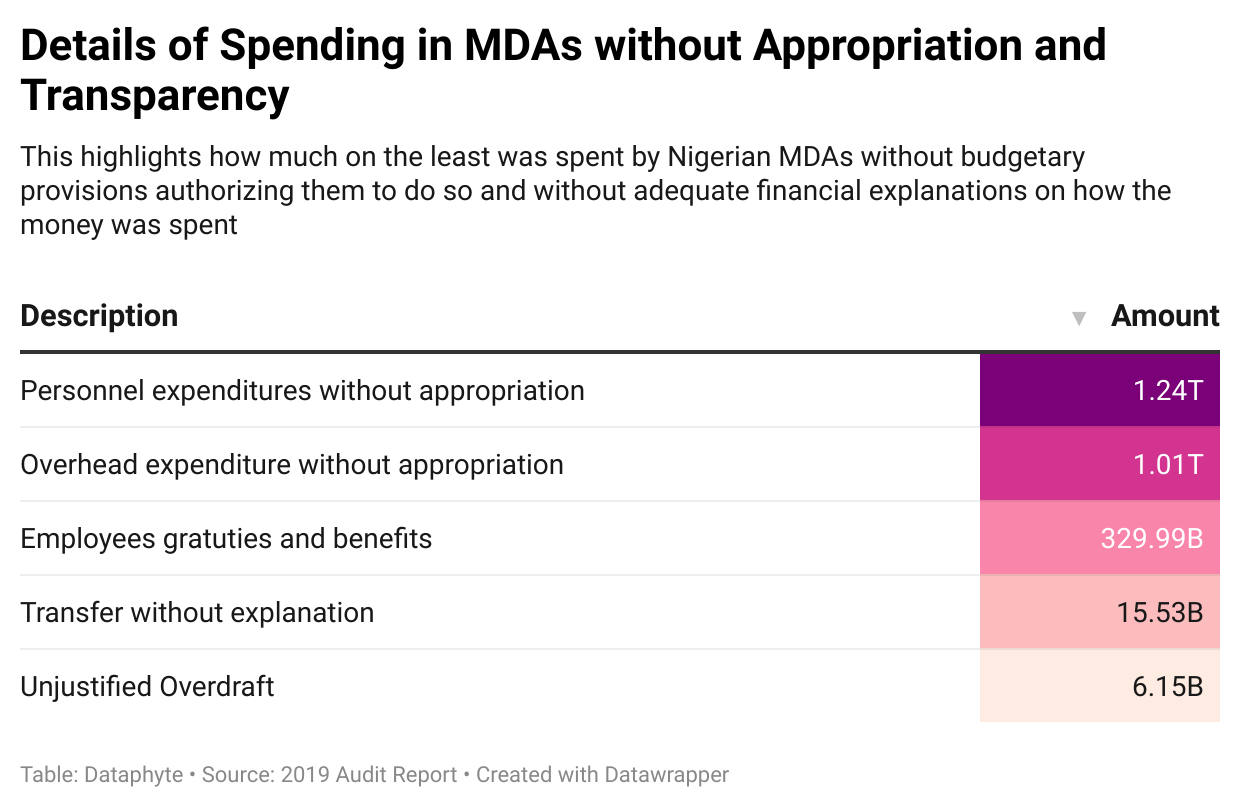
Other Issues
47 MDAs failed to appropriately disclose the sources of aid and grants of up to N372 billion. This is against the provisions of the International Public Accounting standards, which states that; “Additional information that is not presented on the face of the statement of financial position , statement of financial position, statement of financial performance, statement of changes in net assets but that is relevant to the understanding of any of them should be provided”
Overdrawn Accounts
It was stated that 55 MDAs had overdrawn the consolidated revenue fund to the tune of N2.3 trillion. This means that their accounts went down to zero, leading to a negative balance. This is against financial standards and raises concerns over the financial responsibility of the country and its agents.
Some MDAs are flagged on multiple discrepancies. While some responded to the OAGFs request for clarifications with ludicrous, unconnected reasons, some have not responded at all.
Some of the defaulting agencies are Budget and National Planning, Federal Ministry of Justice, Federal High Court, Directorate State Security Service, Federal Road Safety Commission, Digital Technology Registration Board among others.
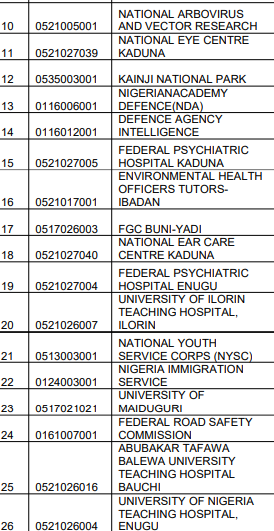
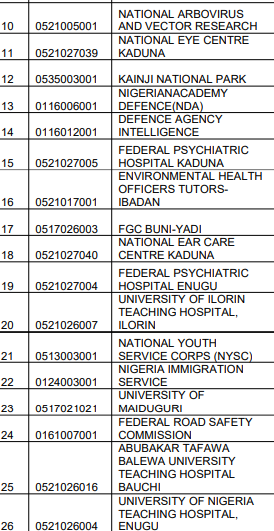
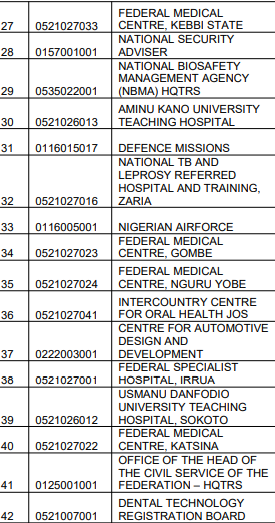
List of Some Eering MDAs (Personnel Unappropriated Spending)
Nigeria May Be On Path To More Fiscal Problems With Continued Lack of Financial Transparency, Spendings Without Appropriation
Nigeria has battled with budget deficits for many years, with borrowings to fund budgets.
Issues such as lack of financial transparency and spending without appropriations may push the country into further financial dilemmas, making it harder to manage available resources and no denying taxpayers full benefit of financial provisions.
These anomalies may also defeat the essence of budget presentations which is to help guide on how monies will be spent.
Already, Nigeria is ranked low by Transparency International on its Corruption Perception Index.
2.5 trillion, the amount spent without appropriation, is 30.1% of the total 2019 budget which was N8.83 Trillion. For the most part this 30.1% figure are monies not planned in the original budget figure presented for 2019.
Nigeria, it appears, keeps borrowing and servicing debts to fund financial irresponsibility.
Experts Weigh In On Nigeria’s Poor Fiscal Transparency, Process
The Chief Executive Officer of the Public and Private Development Centre, Nkem Ilo called for accountability and implementation of laws in the country. She stated that while Nigeria has provisions to tackle these kinds of anomalies, there is poor implementation.
While highlighting the need for transparency especially at a time when Nigeria needs to manage its resources properly amid poor infrastructure and other national demands, the policy expert noted that there is also a need for Nigerians to begin to ask questions and ensure they are part of the process of enforcing transparency in the system.
The deputy director of SERAP , Kolawole Oluwadare while commenting on the development noted that there is a need for action and punishment of those found culpable.
“This kind of unauthorised spending cannot help our fiscal transparency or economic policies either in the long run or short run. What this means is that we can see a trend from 2015 that there is an increase in lack of accountability in public funds. This report comes year after year, detailing not only the amount but also names of those MDAs that have not been able to explain how funds are spent. If nothing is done, such will continue unchecked and that is the height of impunity. It not only affects our accountability but even our budgeting procurement framework and the fight against corruption” he noted.
Kolawole urged the Nigerian government to heed to recommendations of the audit report while ensuring anti-corruption agencies probe allegations levelled against MDAs.

